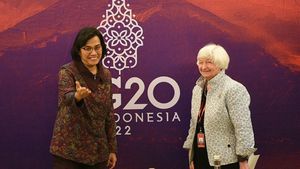JAKARTA – Bank Indonesia (BI) reported that the position of foreign debt (ULN) in March 2023 was US$402.8 billion. This amount is known to have jumped US$2.7 billion compared to February 2023 which amounted to US$400.1 billion.
"Developments in the position of external debt in the first quarter of 2023 were also influenced by changes due to the weakening of the US dollar against the majority of global currencies, including the rupiah," said Head of the BI Communication Department Erwin Haryono in a written statement, Monday, May 15.
It was noted that government debt rose from US$192.3 billion in February to US$194.0 billion in March. Erwin said, the development of the government's foreign debt was influenced by the placement of portfolio investments on the government securities (SBN) market.
"In addition, there is a net withdrawal of multilateral foreign loans that are used to support program and project financing. The government continues to be committed to managing external debt in a prudent, efficient, and accountable manner, including maintaining credibility in fulfilling obligations to pay principal and interest in a timely manner," he said.
The increase in foreign debt also occurred in the private sector (including BUMN) to US$199.4 billion from US$198.6 billion previously.
另请阅读:
Erwin explained that the largest private external debt came from the financial services and insurance sector, the processing industry, electricity procurement, and mining and quarrying.
Erwin also ensured that the structure of Indonesia's external debt remained healthy, supported by the application of the precautionary principle in its management.
This assumption is based on the ratio of Indonesia's external debt to gross domestic product (GDP), which remains stable at around 30.1 percent. In addition, the structure of Indonesia's external debt remains healthy and is dominated by the long term with a portion of 87.6 percent
"In order to keep the external debt structure healthy, Bank Indonesia and the government continue to strengthen coordination in monitoring the development of external debt, supported by the application of the precautionary principle in its management," he stressed.
"The role of external debt will also continue to be optimized in supporting development financing and encouraging national economic recovery, by minimizing risks that can affect economic stability," concluded Erwin.
The English, Chinese, Japanese, Arabic, and French versions are automatically generated by the AI. So there may still be inaccuracies in translating, please always see Indonesian as our main language. (system supported by DigitalSiber.id)
















